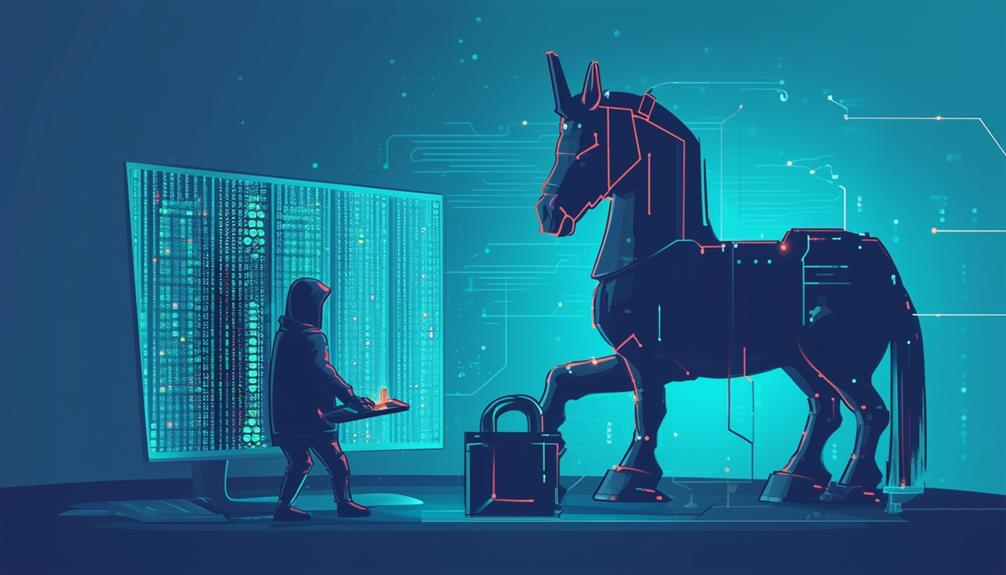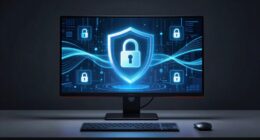Understanding Trojans and backdoors is crucial in fortifying system security against cyber threats. These deceptive tools pose significant risks, exploiting vulnerabilities to compromise systems. They sneak in through emails, downloads, or infected sites, tricking users into unwittingly installing them. To protect your system, execute payloads meticulously, manipulate files with care, and control administrator access tightly. Knowing the strengths of Meterpreter versus the Command Prompt empowers effective ethical hacking. Secure practices like multi-factor authentication and password policies are essential. Mastering these concepts guarantees a resilient defense against cyber intrusions.
Key Takeaways
- Identify trojans and backdoors to prevent unauthorized access.
- Implement robust security measures to defend against cyber threats.
- Utilize advanced tools like Meterpreter for system security.
- Secure system access through proper authentication and controls.
- Regularly update user permissions and passwords for enhanced security.
Understanding Trojans and Backdoors
Trojans and backdoors are deceptive tools used by malicious actors to infiltrate systems and gain unauthorized access, posing significant threats to cybersecurity. Trojans, disguised as legitimate software, sneak into systems to exploit vulnerabilities and compromise security. They often spread through email attachments, software downloads, or infected websites, tricking users into unknowingly installing them.
On the other hand, backdoors provide covert access to systems, allowing attackers to bypass normal authentication processes and gain remote control for malicious activities like data theft.
Understanding Trojans and backdoors is vital for implementing robust security measures to safeguard against unauthorized access and data breaches. By recognizing the deceptive nature of Trojans and the stealthy access granted by backdoors, individuals and organizations can better protect their systems from cyber threats.
Being vigilant against suspicious emails, regularly updating software, and employing strong authentication mechanisms are essential steps in fortifying defenses against these insidious cyber threats.
Risks to System Security
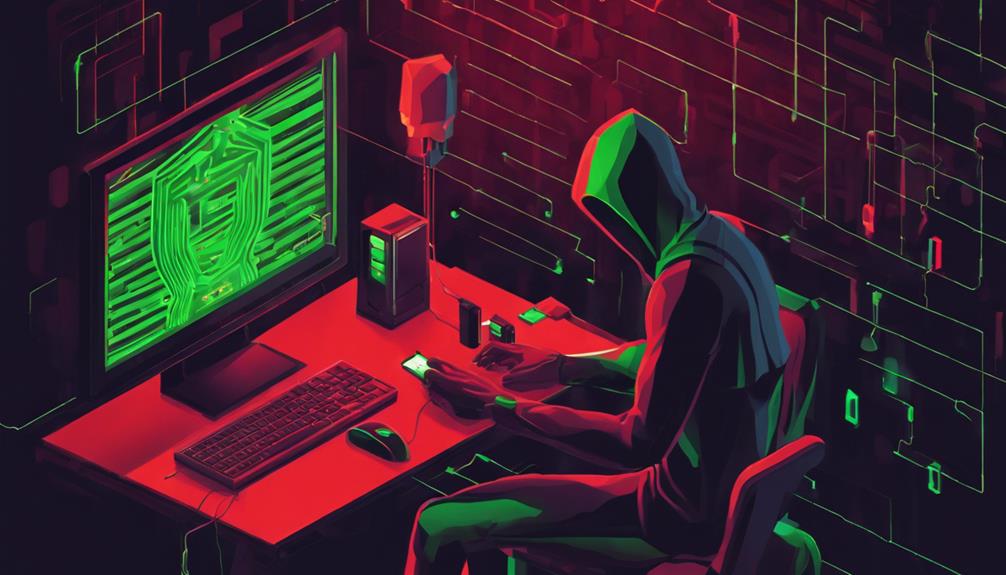
Various vulnerabilities in system security can expose organizations and individuals to significant risks of unauthorized access and data breaches.
Trojans and backdoors are common threats that can compromise the integrity of systems. Trojans, by masquerading as legitimate software, deceive users into installing them, opening the door for attackers to gain control and access sensitive information.
On the other hand, backdoors provide a stealthy entry point for cybercriminals to carry out malicious activities undetected. These risks include data theft, system damage, and the unauthorized utilization of resources.
To mitigate these dangers, it is essential for individuals and organizations to implement robust security measures. Regular system scans and updates can help defend against Trojans and backdoors, enhancing the overall security posture of systems.
Payload Execution Techniques
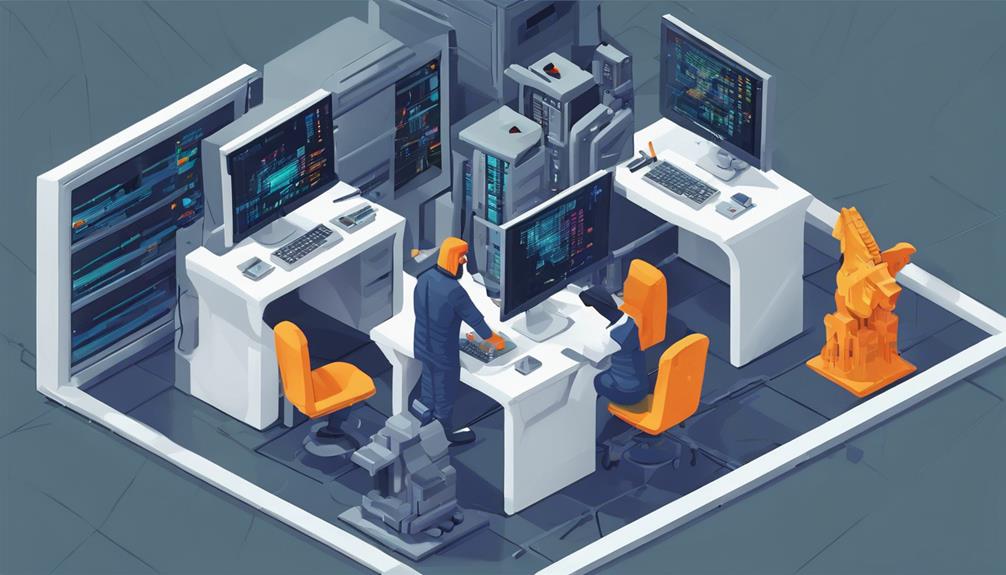
During a recent demonstration on payload execution techniques, a command shell was opened to showcase the initiation of Session 2 for executing the payload. This demonstration highlighted the process of migrating to explorer.exe for the continuous running of the payload. It was explained that having access to the system 32 directory is more vital than desktop access for effective payload execution.
The importance of utilizing the meterpreter prompt for migrating processes was also demonstrated. By using the meterpreter prompt, security professionals can efficiently manage and execute payloads, enhancing the effectiveness of ethical hacking practices.
Understanding payload execution techniques is essential for securing systems against potential threats. By being aware of how payloads are executed and utilizing tools like the meterpreter prompt, individuals can strengthen the security of their systems and prevent unauthorized access or malicious activities.
Stay tuned for more insights on ethical hacking strategies to enhance system security.
File Manipulation Strategies
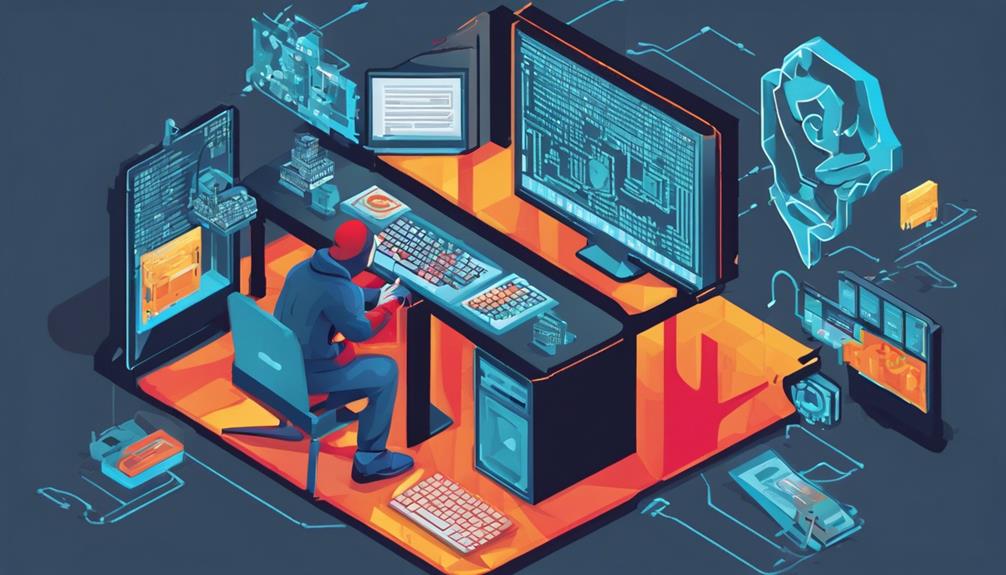
Effective file manipulation strategies are essential for maintaining system integrity and managing data effectively in the domain of ethical hacking to prevent security vulnerabilities.
Here are some key strategies to ponder:
- Directory Creation and Navigation: Understanding how to create directories and navigate through them using the command prompt is vital for organizing files and data effectively.
- Background Processes Awareness: Being mindful of background processes is important as they can prevent files from being deleted. Always check the task manager for running processes before attempting any deletions.
- Deleting Folders: Knowing the correct process for deleting a folder and listing files through the command prompt can help prevent accidental deletion and ensure data is managed efficiently.
- System Management Importance: Recognizing the significance of file manipulation strategies is crucial for efficient system management, helping to maintain security and prevent vulnerabilities from being exploited.
Administrator Access Control
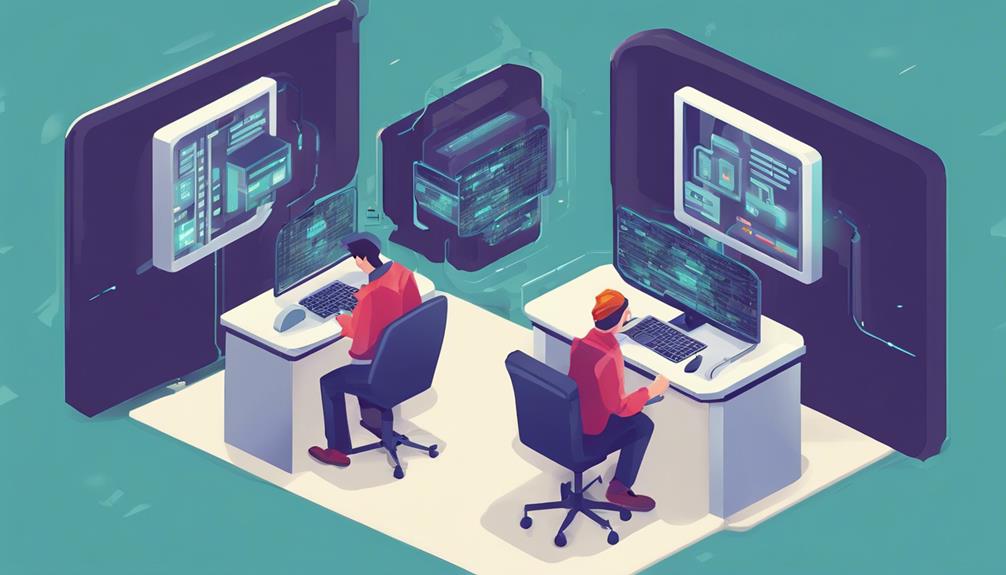
Administrator access control is a critical component of system security. Proper management of user permissions and enforcing secure password policies are essential for safeguarding sensitive data.
Understanding the importance of these practices helps prevent unauthorized access and potential security breaches.
User Permissions Management
Careful management of user permissions is essential to maintain system security and prevent unauthorized access. When handling ethical hacking and administrator access, implementing effective user permissions management is critical.
Here are four key practices to enhance security:
- Grant Administrator Access Selectively: Limit administrator access to only those users who require it for their responsibilities, reducing the risk of unauthorized changes and potential security breaches.
- Regular Review of User Permissions: Consistently reviewing and updating user permissions ensures that access rights remain appropriate and aligned with current security needs.
- Implement Least Privilege Principle: Adhere to the principle of least privilege by granting users the minimum permissions necessary to perform their tasks, minimizing the scope for potential misuse of privileges.
- Utilize Role-Based Access Control: Assign permissions based on job roles or responsibilities, streamlining access management and ensuring that users only have the necessary permissions for their designated tasks.
Secure Password Policies
When managing user permissions to enhance system security, implementing secure password policies is vital for effective administrator access control. Secure password policies play an essential role in safeguarding sensitive systems from unauthorized access. By enforcing strong password requirements and regularly updating passwords, the risk of security breaches can be greatly reduced.
Additionally, incorporating password complexity guidelines and utilizing multi-factor authentication can add an extra layer of protection to administrator accounts, further bolstering system security.
To prevent brute force password attacks on administrator credentials, limiting the number of login attempts and implementing account lockout policies are essential measures. Regularly conducting penetration testing can also help identify vulnerabilities in password policies and address them proactively.
Meterpreter Vs. Command Prompt
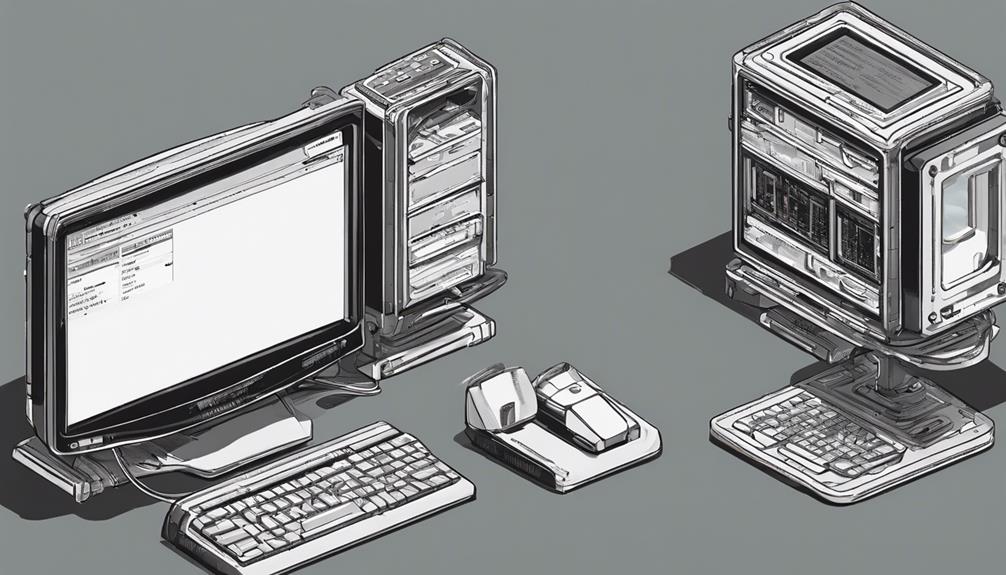
Meterpreter, a powerful post-exploitation tool, surpasses the conventional command prompt in its advanced capabilities for system manipulation.
In contrast, the command prompt is limited in its functionalities, making it less versatile compared to Meterpreter.
Understanding the strengths and weaknesses of both tools is essential for ethical hackers aiming to efficiently gain system access and perform various tasks.
Meterpreter Capabilities Overview
With its advanced features and enhanced functionalities, Meterpreter stands out as a powerful tool for post-exploitation tasks, setting it apart from the conventional command prompt.
Ethical hackers benefit from Meterpreter's capabilities, which include:
- Extensive Features: Meterpreter goes beyond traditional command prompts, offering a wide range of tools for post-exploitation activities and system access.
- Command Execution: Ethical hackers can execute various commands seamlessly using Meterpreter, enhancing their control over the compromised system.
- Process Migration: Meterpreter allows for migrating processes between different systems, enabling efficient operations during assessments.
- Persistent Access: One of the key advantages of Meterpreter is its ability to maintain persistent access to compromised systems, providing ethical hackers with prolonged visibility and control.
Understanding and leveraging these functionalities are essential for ethical hackers to conduct thorough assessments and effectively secure systems against potential vulnerabilities.
Command Prompt Limitations Discussed
Exploring the disparities between the command prompt and Meterpreter reveals significant limitations inherent in the former's functionalities. The command prompt, while a fundamental tool in operating systems, falls short in comparison to Meterpreter when it comes to advanced hacking tasks. Meterpreter offers a wide array of features and capabilities that empower ethical hackers to gain extensive control and manipulate the target system effectively. To illustrate the variations between these tools, let's examine the table below showcasing the key differences in command prompt limitations and Meterpreter functionalities:
| Criteria | Command Prompt Limitations | Meterpreter Advantages |
|---|---|---|
| System Access | Limited permissions | Enhanced system access |
| Functionality | Basic command execution | Advanced features |
| Control | Restricted control | Extensive manipulation |
| Flexibility | Limited capabilities | Versatile options |
Understanding these distinctions is crucial for mastering the tools required for successful ethical hacking operations, emphasizing the importance of incorporating Meterpreter into one's skill set.
Proper Command Usage

Proficiency in utilizing commands effectively is paramount for ethical hackers to guarantee precision and success in system management tasks. To excel in command usage within ethical hacking scenarios, consider the following key points:
- Understand Command Syntax: Knowledge of how commands are structured is fundamental for accurate execution.
- Master Command Options: Familiarity with different command options enhances the hacker's ability to tailor commands to specific tasks.
- Learn Command Parameters: Knowing the parameters that can be used with commands allows for customization and advanced functionalities.
- Practice with Tools: Regular practice with tools like meterpreter and command prompt is essential for honing command execution skills in diverse hacking situations.
Secure System Access Practices

Understanding the significance of secure system access practices is essential for ethical hackers to protect critical systems against unauthorized entry. Secure systems are vital in preventing malicious actors, such as black hat hackers, from exploiting vulnerabilities and gaining unauthorized access to sensitive information. By implementing proper access controls and authentication mechanisms, ethical hackers can mitigate the risk of unauthorized system entry.
It is important for ethical hackers to differentiate between various access levels, such as administrator and user access, to make sure that only authorized individuals have the necessary privileges to perform specific actions on a system. System access grants individuals the power to recover, create, and modify files, emphasizing the importance of using proper commands to avoid unintended consequences or security breaches.
Tools like meterpreter can assist ethical hackers in gaining system access for advanced manipulation tasks, underscoring the advantages of utilizing secure system access practices to maintain the integrity and confidentiality of critical systems.
Frequently Asked Questions
What Is Trojan and Backdoor in Ethical Hacking?
Trojans in ethical hacking are malicious programs disguised as legitimate software to gain unauthorized access. Backdoors are secret pathways used by attackers to bypass authentication. Understanding these threats is essential for maintaining system security.
How Can Computer Trojans Be Prevented?
Computer Trojans can be prevented by employing a multi-layered defense strategy. Utilize reputable antivirus software, update systems regularly, enable firewalls, and educate users on safe online practices. Vigilance and proactive measures are key to safeguarding against Trojan threats.
How Do I Remove Trojan Virus From My Computer?
To remove a Trojan virus from your computer, run a full system scan with updated antivirus software, utilize malware removal tools like Malwarebytes, and disconnect the infected computer from the network. If necessary, access the computer in Safe Mode for manual removal or seek professional cybersecurity assistance.
Does Antivirus Protect Against Trojans?
According to recent studies, antivirus software can effectively protect against many Trojans by detecting and removing them based on their signatures. However, advanced Trojans may bypass detection through encryption or obfuscation techniques, emphasizing the need for additional security measures.
Conclusion
To sum up, staying vigilant against trojans and backdoors is essential for keeping your system safe from cyber threats.
By understanding the risks, executing proper security measures, and using secure access practices, you can protect your data and maintain system integrity.
Remember, just like a vigilant guard protecting a fortress, staying informed and proactive is key to safeguarding your digital assets.
